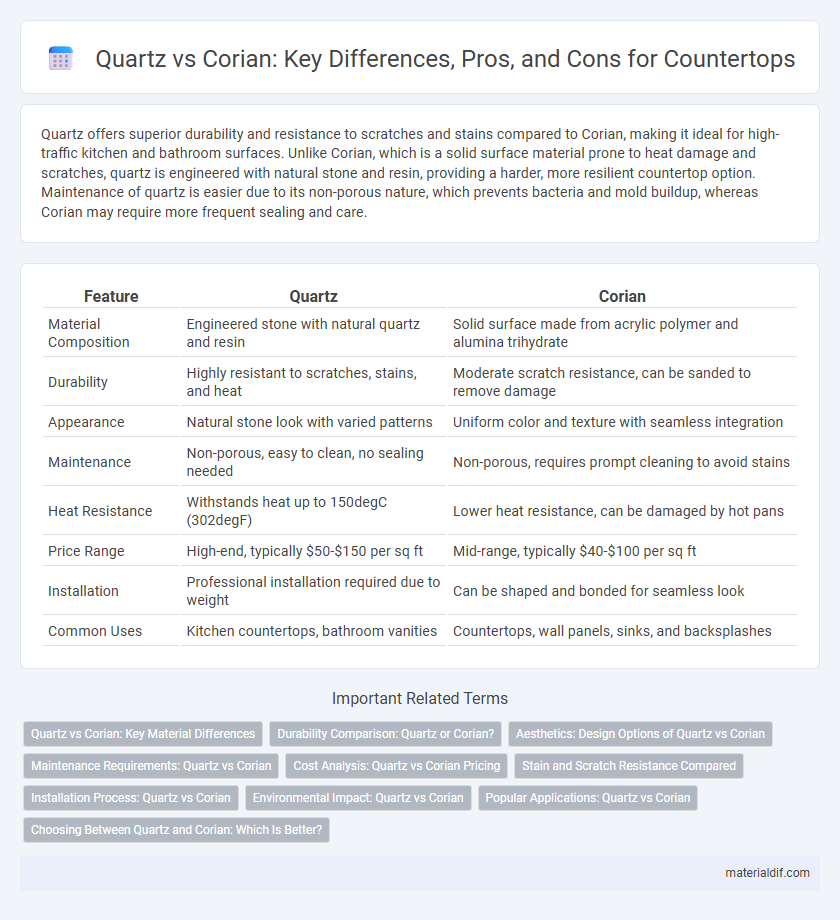Quartz offers superior durability and resistance to scratches and stains compared to Corian, making it ideal for high-traffic kitchen and bathroom surfaces. Unlike Corian, which is a solid surface material prone to heat damage and scratches, quartz is engineered with natural stone and resin, providing a harder, more resilient countertop option. Maintenance of quartz is easier due to its non-porous nature, which prevents bacteria and mold buildup, whereas Corian may require more frequent sealing and care.
Table of Comparison
| Feature | Quartz | Corian |
|---|---|---|
| Material Composition | Engineered stone with natural quartz and resin | Solid surface made from acrylic polymer and alumina trihydrate |
| Durability | Highly resistant to scratches, stains, and heat | Moderate scratch resistance, can be sanded to remove damage |
| Appearance | Natural stone look with varied patterns | Uniform color and texture with seamless integration |
| Maintenance | Non-porous, easy to clean, no sealing needed | Non-porous, requires prompt cleaning to avoid stains |
| Heat Resistance | Withstands heat up to 150degC (302degF) | Lower heat resistance, can be damaged by hot pans |
| Price Range | High-end, typically $50-$150 per sq ft | Mid-range, typically $40-$100 per sq ft |
| Installation | Professional installation required due to weight | Can be shaped and bonded for seamless look |
| Common Uses | Kitchen countertops, bathroom vanities | Countertops, wall panels, sinks, and backsplashes |
Quartz vs Corian: Key Material Differences
Quartz is an engineered stone composed of approximately 90% ground quartz mixed with resin, offering superior durability and non-porous properties. Corian, made primarily from acrylic polymer and natural minerals, boasts seamless installation and ease of repair but is less resistant to heat and scratches compared to quartz. Quartz's hardness rates around 7 on the Mohs scale, making it more scratch-resistant than Corian, which is softer and more prone to surface damage.
Durability Comparison: Quartz or Corian?
Quartz surfaces outperform Corian in durability due to their higher resistance to scratches, heat, and stains, making them ideal for heavy-use kitchen countertops. Corian, while durable, is more susceptible to surface scratches and heat damage but can be easily repaired or refinished to restore its appearance. Quartz's non-porous composition resists bacteria and discoloration better than Corian, enhancing longevity and maintaining aesthetic appeal over time.
Aesthetics: Design Options of Quartz vs Corian
Quartz offers a wide range of vibrant colors, patterns, and finishes, providing homeowners with extensive design flexibility. Corian features a uniform appearance with subtle colors and seamless integration, favored for minimalist and sleek aesthetics. Both materials enable customized looks, but quartz excels in mimicking natural stone variations.
Maintenance Requirements: Quartz vs Corian
Quartz surfaces require minimal maintenance due to their non-porous nature, resisting stains and bacteria without the need for sealing. Corian, while also low-maintenance, benefits from periodic cleaning with mild soap and water and occasional buffing to maintain its matte finish and repair minor scratches. Both materials offer durable options, but quartz's superior resistance to staining and chemical damage lowers long-term upkeep efforts compared to Corian.
Cost Analysis: Quartz vs Corian Pricing
Quartz countertops typically range from $50 to $150 per square foot, offering a mid to high-end pricing tier compared to Corian, which generally costs between $40 and $100 per square foot. Quartz's higher cost is influenced by its durability and natural stone composition, making it more resistant to scratches and heat than Corian's solid surface material. Budget-conscious homeowners may prefer Corian for its lower upfront price and easier repairability, but investing in quartz can provide longer-term value due to its superior lifespan and maintenance advantages.
Stain and Scratch Resistance Compared
Quartz surfaces exhibit superior stain resistance compared to Corian, as quartz's non-porous nature prevents liquids from penetrating and causing discoloration. Scratch resistance is also higher in quartz, which contains natural quartz crystals fused with resin, making it more durable and less prone to surface damage than Corian's acrylic composition. Both materials offer solid performance, but quartz is generally the preferred choice for areas demanding enhanced stain and scratch durability.
Installation Process: Quartz vs Corian
Quartz countertops require professional installation due to their heavy weight and need for precision cutting with specialized tools, ensuring durability and seamless appearance. Corian, being a solid surface material, allows for easier customization and repair during installation, as it can be thermoformed and joined invisibly by skilled installers. Both materials demand expert handling, but Corian offers more flexibility in shaping and on-site modifications compared to the rigid, engineered quartz slabs.
Environmental Impact: Quartz vs Corian
Quartz countertops are composed mainly of natural quartz combined with resins and pigments, resulting in a durable surface with lower environmental impact due to less energy-intensive manufacturing processes compared to Corian. Corian, a brand of solid surface material primarily made from acrylic polymers and alumina trihydrate, involves higher carbon emissions and non-renewable petrochemical usage during production. Quartz offers better sustainability credentials, with increased recyclability and longer lifespan, reducing waste and environmental footprint over time in comparison to Corian.
Popular Applications: Quartz vs Corian
Quartz countertops are widely preferred for kitchen surfaces, bathroom vanities, and backsplashes due to their durability and low maintenance. Corian is commonly used for seamless countertops, wall cladding, and custom sinks, offering design flexibility with its integrated shapes. Both materials excel in residential and commercial applications, with Quartz favored for high-traffic areas and Corian chosen for smooth, non-porous surfaces.
Choosing Between Quartz and Corian: Which Is Better?
Quartz offers superior durability and scratch resistance due to its natural stone composition combined with resin, making it ideal for high-traffic kitchens. Corian, a solid surface material, excels in seamless installation and repairability, providing a smooth, non-porous surface resistant to stains and mildew. Selecting between Quartz and Corian depends on priorities like durability versus design flexibility, with Quartz favored for heavy use and Corian preferred for customizable, integrated sink options.
Quartz vs Corian Infographic

 materialdif.com
materialdif.com